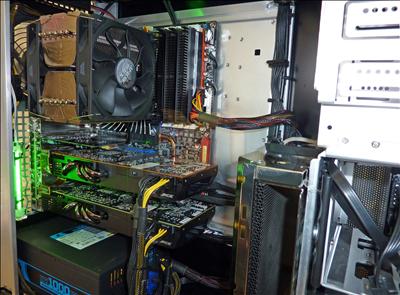A look at the Beast from Bolton
The PC ships with anti-static bubble-wrap securing the components in place, and Scan's been doing this for a while now.SilverStone's Temjin was once considered a large chassis. Since then the likes of Cooler Master and Corsair have inundated the enthusiast with cavernous cases that resemble workstation chassis.
The sole optical offering, LG's combo-drive, doesn't write to Blu-ray discs. You will need to pay an additional £60 for that privilege.
Scan's system ships with the windowed side-panel version of the chassis showing the guts of the beast. Weighing in at over 20kg for the base unit alone, Scan may just bundle a gym membership with the machine.
A long-time favourite of Scan has been the Prolimatech Megahalems aftermarket heatsink that keeps the Core i7 920 ticking away at 4GHz without breaking a sweat. Corsair Hydro H50 costs around £20 more - an optional extra via the configurator - and we'd be inclined to go with that as it's less likely to be affected by the heat emanating from the two hot-running GPUs.
Choice of motherboard has been made with the two GeForce GTX 480 cards in mind. Unlike the ASUS P6X58D Premium that HEXUS uses as a test platform, the P6TD Deluxe's full-bandwidth x16 PCIe slots are spaced far enough apart to leave a much-needed gap between the two cards.
But a downside of using a slightly older board from ASUS' catalogue is that it misses out on some newer features - USB 3.0 and SATA 6Gbps spring to mind - but they can be added in with the bundling of an expansion card.
The two GeForce GTX 480 cards dominate the centre of the PC, leaving little room for expansion, though.
A peek at the other side shows the TJ09's mid-section fan that blows air over the GPUs.
Scan then throws in a number of additional fans - two exhaust at the top, rear exhaust - with the aim of keeping the system quiet under load. We reckon that the slightly larger TJ10, especially the 'NVIDIA-optimised' edition, would perhaps be a better bet.















